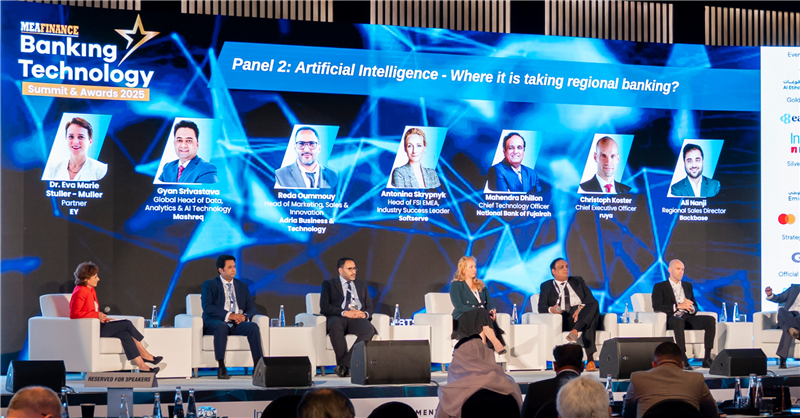
Don't want to miss a thing?
Driving AI Excellence in Financial Services: Key Takeaways From MEA Finance 2025
AI is poised to change banking. In Dubai, SoftServe discussed how banks should be preparing to make the most of it
The MEA Finance Banking Technology Summit 2025 brought together industry leaders and innovators to discuss the ongoing transformation of the financial services industry (FSI). I had the privilege of representing SoftServe on the panel Artificial Intelligence – Where it is taking regional banking? While we explored how AI is redefining the way financial institutions operate, my fellow participants shared insights on AI’s most impactful applications, the challenges faced during implementation, and strategies for scalable success.
The underlying message was clear: AI has huge potential to accelerate business results and bring customer experience with financial services to a new level. It can drive hyper-personalization built on top of a single customer view and data-driven insights — turning passive customers into active clients. There are also substantial opportunities for cost and time reductions. Yet to guarantee successful scaling and value-driven implementations, financial institutions — including the most technologically agile banks — must focus on compliance, business stakeholders’ buy-in, solutions’ client-centricity, and data fundamentals while accelerating with AI.

Data and compliance: key considerations in AI implementation
While AI promises unparalleled opportunities, there remain areas requiring thorough attention by both business and tech leaders in financial institutions.
Centralizing and accessing data remains a concern, even for the technologically progressive financial institutions in the Middle East. With vast volumes of structured and unstructured information, many organizations still face challenges in utilizing this data meaningfully. Siloed systems and fragmented architecture prevent financial entities from creating a unified view of their customers. Only with accessible and reliable data can financial institutions continue with the credo of acceleration, which has defined the region for the last 10 years.
Of course, questions of compliance also took center stage. As regulations shift to keep up with AI-driven advancements, financial institutions must remain vigilant in ensuring solutions are reliable, secure, and compliant. Indeed, it is difficult to imagine a serious banking executive trusting in the public rollout of a solution that has only ever existed in a sandbox.
Given the concerns about data integrity and compliance, how can financial institutions — driven by the promise of increased revenue from AI — build the foundation for robust AI solutions for FSI?
Building scalable AI solutions in FSI
While there is no one-size-fits-all solution for banks pursuing AI projects, one critical theme underpinned the discussion: the need to balance innovation with practicality. The key steps for scalable success with AI include:
- Business-driven use cases: Start with a specific business objective that AI solutions aim to achieve. Early investment in understanding data quality and accessibility is critical.
- Client-centricity: AI projects should always be grounded in the value they deliver to end-users, whether through improved decision support or enhanced personalization.
- Trust through centralization: Stakeholder engagement and organizational transparency keep teams aligned on shared goals. That prevents siloed decision-making and issues in scaling solutions cross-organizationally.
- Embedded governance: Robust frameworks to ensure automated compliance, reliability, and accountability are non-negotiable. They provide a safe path for innovative projects at scale.
- Strategic partnerships: Partnering with technology providers offers access to top tech talent, advice, and guidance in scaling solutions and closing skill gaps. These collaborations pave the way for faster adoption and integration of AI into existing business systems.

A future fueled by collaboration
The resounding consensus from my panel is that AI has gone beyond being a future technology; it ought to be firmly entrenched in the present strategy of leading financial institutions worldwide. From transforming the customer experience to streamlining operations, AI is redefining how we think about financial services. But the road ahead requires focus, collaboration, and innovation.
To successfully scale AI solutions within the financial services industry, organizations must approach the adoption process strategically and deliberately. While the Middle East is widely recognized for its advanced progress in AI implementation, achieving success relies on addressing key steps in the AI adoption and scaling journey. These include building a strong business case, securing executive buy-in, prioritizing client-centric and value-driven strategies, and ensuring robust data fundamentals and governance for compliance.
At SoftServe, we partner with organizations at every stage of their AI transformation. Our commitment to excellence was recognized at the MEA Finance Banking Technology Awards, where we received two accolades:
- Best Digital Transformation Consultancy Firm
- Best User Experience Solution Provider
These awards underscore our dedication to helping organizations harness the power of AI to drive meaningful change. Whether you’re just starting your AI strategy or optimizing advanced systems, SoftServe is here to support you with innovative, scalable solutions.


